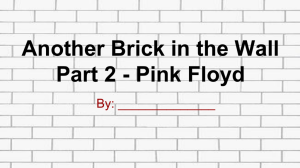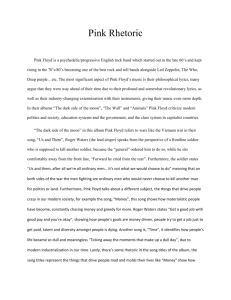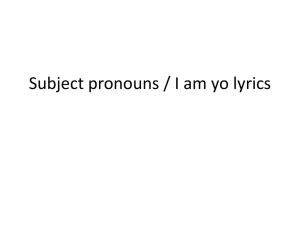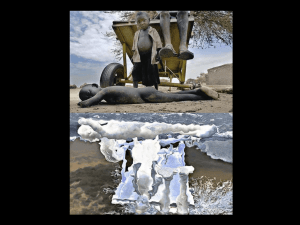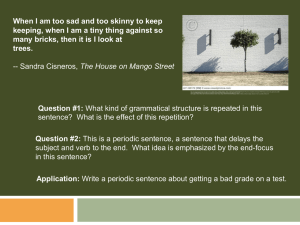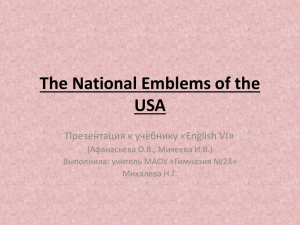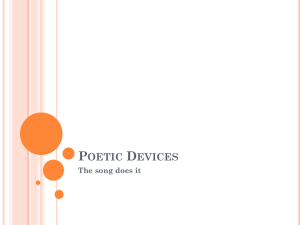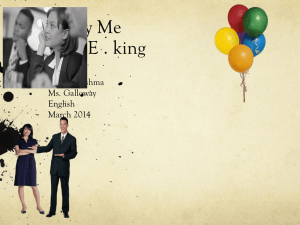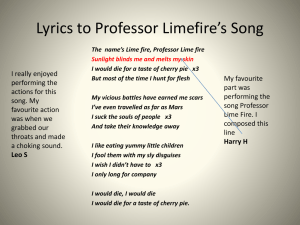Another Brick in the Wall sample
advertisement
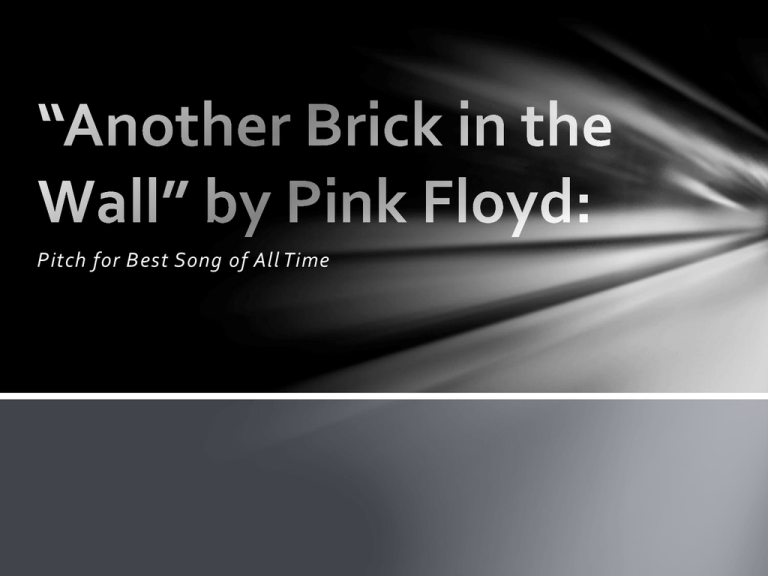
Pitch for Best Song of All Time Pink Floyd The band was made up of four members at the time of the album/song: Nick Mason (drums); Dave Gilmour (Guitar, Vocals); Roger Waters (Bass, Vocals); Richard Wright (Keyboards, vocals, other instruments) (EMI record label) The Wall (1979) The album was meant to tell as story of a rock star’s mental breakdown. Each song links to the next, though not many “characters” are obvious. The album was made into a movie called, Pink Floyd: The Wall in 1982. It grossed over $22 million at the box office. Longevity The album debuted at #3 of the UK charts, but spent 15 weeks at #1 in the US during 1980. Has sold over 20 million copies, worldwide (11.5 million in the US, alone) Has been gone “Platinum” 23 times. The band then put on a series of live performances of the entire album, in rock theatre concert-style. Four original shows, only, played in Los Angeles; London, England; Uniondale, Long Island; Dortmund, Germany. Longevity (cont.) The band performed the album live again in 1990 when the Berlin Wall (separating East and West Berlin) came down in Germany. The concert was held amongst the ruins of the Berlin Wall, itself, with many “guest star” singers performing the material, too. Approx. 400 000 people were able to watch it live, and the concert was broadcast to 35 countries, as well. “Another Brick in the Wall” – Part 2 We don't need no education We don't need no thought control No dark sarcasm in the classroom Teachers leave them kids alone Hey teacher! Leave them kids alone All in all it's just another brick in the wall All in all you're just another brick in the wall We don't need no education We don't need no thought control No dark sarcasm in the classroom Teachers leave them kids alone Hey teacher leave them kids alone All in all it's just another brick in the wall All in all you're just another brick in the wall Purpose • The song is meant to criticize government run education in England, particularly from the 1950s until the 1970s. • Teachers and the education system wrongfully abuse, both emotionally and physically, students in order to mold them into the kind of individuals that British society wanted to produce. Song Charts Debuted at #1 in the UK, and stayed there for 5 weeks The song was Pink Floyd’s only chart topper It hit #1 in the US and stayed there for 4 weeks #1 in Canada, Norway, New Zealand, West Germany, Portugal, Israel, and also in South Africa, though it was promptly banned from that country Reached #57 on the Disco Chart One of three Pink Floyd songs listed in the Rock and Roll Hall of Fame’s list of 500 Songs that Shaped Rock and Roll Rhythm, Tempo and Pitch Strong, repetitive beat (disco) – not Pink Floyd’s usual sound A chant-like way of singing (helps reinforce the “one of the mob—no individuals” sentiment) Strong notes that could mimic punching or a repetitive kicking (pushing down the individual) Piercing guitar solo at the end of the song Repetition The entire song is one verse repeated twice (the 2 nd time by a children’s choir from a school located down the street from the recording studio). Key phrases: “Teacher, leave those kids alone!” “All in all, you’re just another brick in the wall.” Messages (Explicit and Implicit) The education system’s main goal is to bully and contort kids, making them into the “final product” that they want. No one has any freedom to be their own person in such a system. They are only “bricks” that make up the “walls” that help close everyone in and isolate them from others. The “wall” is a metaphor for the perfect world that the government and its institutions want to build—at any cost. It can also be the walls built around yourself for protection. The education system produces mindless “robots” that go along with the governments views, no matter what those views are (link to the evil of the German Nazis from WW2) Description of Video Official Music Video Video opens with a shot of London, England, and children running out of various buildings, presumably trying to escape something. The animated “teacher” character is introduced who promptly starts putting children through a meat grinder that is shaped like a school. The teacher then turns into a hammer, which then smashes down into something (or someone) off camera. A brick wall captures a small “doll-like” figure that appears helpless. This image is repeated often. Three Most Effective Images #1 The Teacher and the “Meat” Grinder “Meat” Grinder This image is effective because you can see the kids screaming and struggling as the teacher forcibly shoves them through the “school” process. They come out the other side, looking all the same, and all trace of each individual kid is gone. The education system has completed its goal of producing the citizens they want. Three Most Effective Images (cont) #2 The brick wall surrounding the doll-like figure “The brick wall” The wall surrounds the “doll.” This could either be that each individual feels the need to hide themselves away from all the pressures of the world or the world has succeeded in closing off the person from everything that would make them unique. Either way, this is a situation that encourages rebellion because neither of these situations are beneficial for the person. Three Most Effective Images (cont) #3 The hammers marching “The Hammers Marching” The link to the German armies of WW2 is not by accident in this image. The message implies that under such strict government control (as is done through the British education system), the people under that government will be little more than mindless drones who march wherever they are told to do so. This, too, is something that must be rebelled against in order to protect our individual freedom of thought. The threatening storm clouds in the image show us that such an outcome would be similar to doomsday for our society. Personal Connection Throughout my years of high school, in particular, I had very few teachers whom I thought were actually good teachers. Almost none encouraged new ways of thinking instead of simply forcing us to spit out whatever answer they thought was best. I found this frustrating and a waste of time. I even had a math teacher who would throw chalk and textbooks at us if he thought we were being too “stupid.” He, ironically, really knew his stuff. It wasn’t until I went to university that I experienced true freedom of thought. Conclusion I think that “Another Brick in the Wall – Part 2” should win the Best Song of All Time award because, even though it seems like such a simple song, the meaning behind the lyrics is complex and is still relevant thirty years later. It deals with insightful social issues and demands that the listeners think critically, not just about the song, but also about what is going on in the world around them; and most importantly, the song makes you think about who is trying to repress your individuality for the “greater good.”
